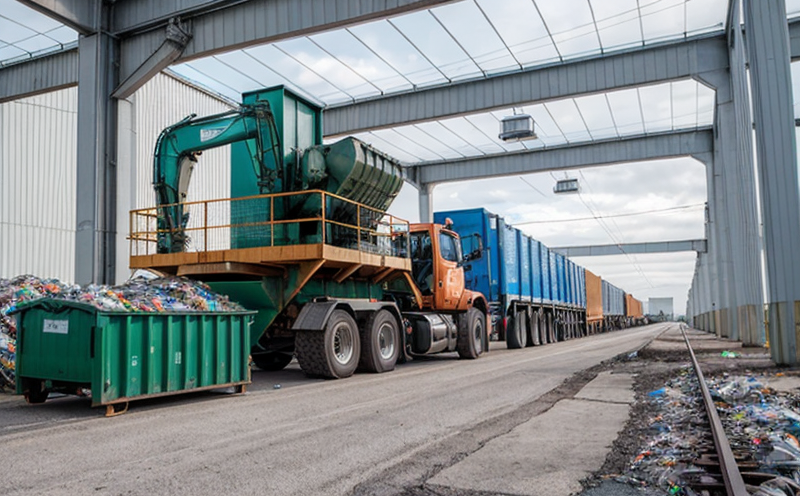ASTM D8176 Glass Recycling Process Testing
The ASTM D8176 standard provides a comprehensive framework for evaluating glass recycling processes. This standard is essential in ensuring that recycled glass meets the quality requirements necessary for reuse in various applications, including construction materials and container manufacturing.
Recycling glass not only conserves natural resources but also reduces landfill waste and energy consumption associated with producing new glass from raw materials. The ASTM D8176 test addresses critical parameters such as particle size distribution, chemical composition, and mechanical properties to validate the quality of recycled glass products.
The testing process involves several steps: sampling, preparation, analysis, and reporting. Samples are collected from the recycling facility or processing plant, then prepared according to specified ASTM protocols. Key tests include:
- Particle size distribution analysis using sieves
- Chemical composition analysis by inductively coupled plasma-optical emission spectrometry (ICP-OES)
- Mechanical property testing such as compressive strength and durability under simulated conditions
The results of these tests are used to assess whether the recycled glass meets the specified quality criteria outlined in ASTM D8176. Compliance with this standard ensures that recycled glass can be effectively utilized in downstream processes without compromising product integrity or safety.
For industries focused on sustainability and circular economy principles, ASTM D8176 plays a crucial role in promoting responsible resource management practices. By adhering to these standards, manufacturers can enhance their reputation as environmentally conscious entities while maintaining high-quality product offerings.
Industry Applications
The ASTM D8176 standard finds application across multiple sectors within industrial manufacturing and processing, particularly those involved in recycling and circular economy initiatives. Key industries include:
- Packaging and container manufacturers
- BUILDING MATERIALS MANUFACTURERS
- Construction companies specializing in green building projects
- Environmental consulting firms advising on waste management strategies
In these environments, ASTM D8176 helps ensure that recycled glass is fit for purpose. For instance, in the packaging industry, compliance with this standard ensures that recycled glass can be used safely and effectively in bottle manufacturing processes. In construction, it guarantees the structural integrity of concrete made from blended aggregates containing recycled glass.
The adoption of ASTM D8176 also supports broader corporate sustainability goals by providing clear guidelines on how to manage waste streams efficiently while maintaining product quality standards. This aligns with global trends towards reducing environmental impact and promoting resource efficiency.
Why Choose This Test
Selecting ASTM D8176 for your glass recycling process testing offers several advantages:
- Ensures Quality Compliance: By meeting the stringent requirements set forth by this standard, you can guarantee that your recycled glass meets industry standards.
- Promotes Sustainability: Your commitment to using ASTM D8176 demonstrates your dedication to environmental responsibility and sustainability.
- Enhances Reputation: Compliance with recognized international standards like ASTM D8176 enhances your company's reputation among stakeholders, including customers, investors, and regulatory bodies.
- Safeguards Product Integrity: Rigorous testing ensures that recycled glass is suitable for its intended applications without compromising performance or safety.
In summary, choosing ASTM D8176 means investing in reliable quality assurance practices that support both business objectives and environmental stewardship.
Quality and Reliability Assurance
The ASTM D8176 standard plays a vital role in ensuring the reliability and consistency of recycled glass products. Through comprehensive testing, this standard helps identify potential issues early on, allowing for corrective actions before they affect downstream processes or final products.
Key aspects of quality control under ASTM D8176 include:
- Particle Size Distribution: Ensuring that recycled glass particles fall within acceptable ranges prevents clogging in production equipment and maintains uniformity across batches.
- Chemical Composition: Accurate analysis of trace elements ensures compatibility with other raw materials used in manufacturing processes.
- Mechanical Properties: Evaluating strength, flexibility, and durability helps determine the optimal use of recycled glass within specific applications.
The consistent application of ASTM D8176 across different facilities ensures that all parties involved are working towards common goals. This consistency fosters trust among stakeholders and contributes to long-term success in recycling initiatives.
Moreover, adherence to this standard facilitates seamless integration between suppliers and end-users, reducing supply chain disruptions and enhancing overall efficiency. By prioritizing quality through ASTM D8176, you contribute significantly to the broader goals of sustainable development.





